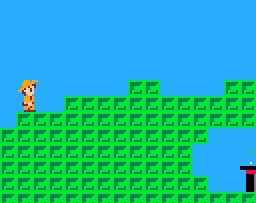(mild spoiler warning)
A beautiful puzzle within a world that's more than meets the eye. I got stuck a few times, but the next step was always in view and that enticed me to keep trying, to keep asking, "what if I try this?" Many discoveries were literally groundbreaking; they completely shifted my mental model of the world. Theorems -- mental shortcuts -- I had previously established about the world, now had to be thrown out the window and re-evaluated. This was not frustrating; it was liberating, if that makes sense. I really enjoyed those moments. I wish I could erase my memory of the game so that I can experience uncovering the world once more.
In the beginning the platforming was frustrating because I often knew what I wanted to accomplish, but I frequently fumbled the jumps, which either slowed me down (which adds up when I'm repeating the same section many times while I'm testing strategies; perhaps a fair punishment for my lazy unwillingness to visualize the steps in my mind) or I end up in the wrong section of the world and I can't go back without restarting. I eventually mastered the platforming, but only after stepping away for a day. I realize that the platforming is an homage to Atlantis no Nazo, though, so I understand it was intentional and I respect that decision.
I'm reminded of Spelunky. In that game there is also a secret path that occupies the same space as the main path, but is "unlocked" by a combination of knowledge and items. In both games, I appreciate how the worlds fold back onto themselves, each layer separated not physically but temporally. Hidden in plain sight, as it were. You could say that all Metroidvanias have this quality I suppose, but I think there's more to say about the flavor of this particular game, so let me make an additional distinction. There are "hard" obstacles, the kind that require a specific item to reach a specific area, but it's pretty obvious what needs to happen (like, say, a keyhole). There are obstacles of obscurity, which require only knowledge (like, say, a secret door, or see interactive fiction 9:05). Then there are "hybrid" obstacles, requiring a non-obvious usage or combination of items, and thereby some global knowledge about the world. This game has a lot of that, and on top of that I think it's fair. Like it would be really easy to devise a sequence that no one could reasonably figure out on their own (I think Spelunky is like that), but you made discoverability feasible, somehow!
I could go on but anyway that's a lot of words to say you made an awesome game that made me think, and then made me think about my think. Thank you for making it.




Leave a comment
Log in with itch.io to leave a comment.